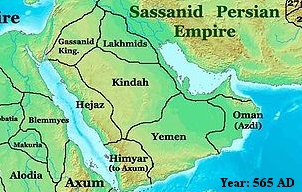
|
|

|
Welcome, Guest!
For access & update rights
Log In
or Register Instantly
|
|
|
 It must be noted that the inclusion of the Ghassanids in Geadah.com is due to the strong odds which exist between the the ancestrally family of Naimeh to the Ghassanids through the village of Baskinta, Lebanon.
It must be noted that the inclusion of the Ghassanids in Geadah.com is due to the strong odds which exist between the the ancestrally family of Naimeh to the Ghassanids through the village of Baskinta, Lebanon.
The Ghassanids (al-Ghasasinah, also Banu Ghassan "Sons of Ghassan") were Arab Christians that emigrated in the year 250 AD from Yemen to the Hauran (Houran), in southern Syria. The term Ghassan refers to the kingdom of the Ghassanids, and is the name of a spring of water in the Hauran. The Ghassanid emigration has been passed down in the rich oral tradition of southern Syria. It is said that the Ghassanids came from the city of Ma'rib in Yemen. There was a dam in this city, however one year there was so much rain that the dam was carried away by the ensuing flood. Thus the people there had to leave.
Unlike many pre-Islamic Arab tribes, the Ghassanids were not pagans but monophysite Christians members of what later came to be called the Syrian-Jacobite church. It was, in fact, through the personal intervention of al-Harith ibn Jabala that Ya'qub Bar-Addai, better known as Jacob Baradaeus (whence the term "Jacobite"), was consecrated Bishop of Edessa for the provinces of Syria and Mesopotamia, in 542 or 543. The rigidly monotheistic doctrine of Syrian Christianity probably helped to prepare the Arabs of Ghassan for the revelation of Islam, whose Prophet Muhammad was born very soon after al-Harith ibn Jabala's death in 569.
Many Christian families of Lebanon, Jordan, Syria, and Palestine trace their roots to the Ghassanid dynasty. The religious backgrounds of these families tend to be either Greek Orthodox or Greek Catholic and some are Maronite Catholic, despite the Ghassanids' Non-Chalcedonian Syriac Orthodox religion.
|
|
|
|

